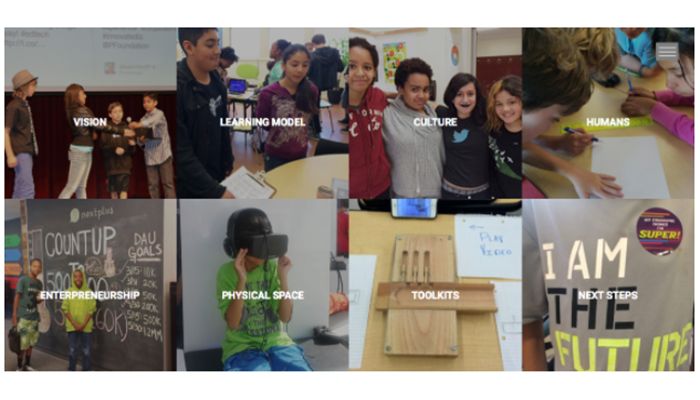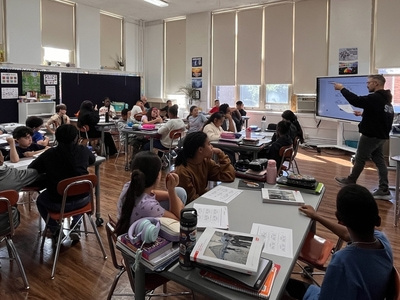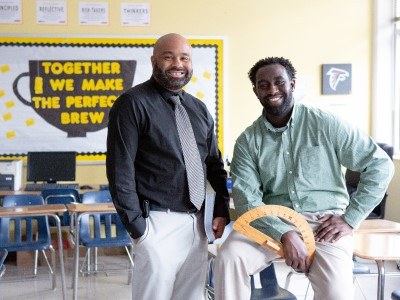Professional Learning
Playbook to Create an Education Culture of Experimental Innovation
Topics

Educators are the lead learners in schools. If they are to enable powerful, authentic, deep learning among their students, they need to live that kind of learning and professional culture themselves. When everyone is part of that experiential through-line, that’s when next generation learning thrives.
Innovation is a heavy burden when viewed as a singular heroic (or threatening) act. Instead, nurture innovation with a culture of micro-innovations—what teachers do everyday.
"You are the average of the five people you spend the most time with."
–Jim Rohn, Business Guru
Technology is Not Enough
My team and I recently visited a pioneering district in its sixth year of 1:1 implementation. The majority of teachers were very enthusiastically and articulately deploying technology as a substitute for paper-and-pencil, transmission-based teaching methods. Instead of paper worksheets, teachers were enabling students to use their iPads to do their work, which was then printed out and put into portfolios.
Thoughtfully using the SAMR model to frame their analysis, the district’s leadership hoped that more teachers would move toward innovative practices, ones in which technology serves to augment, modify, and redefine teaching and learning. One of their bellwether metrics to measure this shift is paper use, which, unfortunately, had not declined at all since they implemented 1:1. Thus, like many leaders on the cutting edge of next gen education, they recognized that deeper cultural shifts were needed for those more innovative practices to take hold.
As my colleagues at Boston Public Schools and I debriefed our visit, we lauded the remarkable ownership and motivation we saw. We then focused on one framing question: How could we harness educator enthusiasm and ownership and drive it toward educator engagement with innovation?
Fixed Mindset vs. Innovation Culture
Culture has a variety of meanings, one of which is a shared set of beliefs and practices. Classrooms have culture, as do schools, districts, and communities. Culture is created and enacted in the daily interactions between humans, Jim Rohn’s average of the five people you spend the most time with.
In response to the changing world and economy, many school and district leaders are thinking about how to create innovation cultures that encourage shifting our adult educator mission away from producing cookie-cutter proficient students toward nurturing individuals capable of and excited to thrive in agile environments.
For this to happen, ed leaders need to nurture the same sort of growth in the adults who make up our staff. We need to enable our educators to identify themselves as innovators.
Innovation all too often is seen by leaders and staff alike as a fixed, innate characteristic (often associated with youth). We hear and accept fixed mindset phrases like, “That’s how we’ve always done it,” or “We have to do this way,” or I’m not good at technology,” or “I don’t do social media.”
Reframing Innovators
Adam Grant, in his book Originals, offers a way to reframe these fixed-growth, young-old oppositions and unleash the innovation capacity of our entire teaching force. He draws a distinction between two types of innovators: conceptual innovators, almost invariably young, who develop a profound system-shifting insight (and then often spend their entire career developing or tweaking it—think Einstein); and experimental innovators, almost invariably more experienced, who are slow and steady incremental tinkerers shifting systems through their accumulated innovation wisdom (think Leonardo Da Vinci or Martin Luther King, Jr.).
Most teachers, especially those who have developed the strong classroom management repertoire you spend your first few years on, tinker on a regular, if informal, basis. They experiment with new techniques for addressing Chloe’s chronic tardiness and redesign fractions lessons to help Nayeli access content across a language barrier. They develop and expand their teaching toolkit through trial-and-error, in essence as experimental innovators.
Reframing Daily Teaching Practice as Experimental Innovation
I think of leadership’s role as growing capacity by making both bright spots and needs visible, and then supporting people in becoming solvers of their own problems. Innovation is a heavy burden when viewed as a singular heroic (or threatening) act. We can take away the heavy burden by growing a culture of micro-innovations—what teachers do everyday—and activate innovators throughout our schools and districts. To do this we have to provide entry points and make the daily innovation visible. We have to connect the people who are doing the work, so culture (the five people you interact with most) begins to shift.
Two what ifs and a playbook composed of toolkits composed of micro-innovation practices can move us in that direction:
What Ifs
- What if leaders looking to grow a culture of innovation began to highlight, frame, document, and share these micro-innovation, trial-and-error practices and processes that are occurring daily?
- And what if, understanding that we (at work) are the average of the five people we spend the most time with (at work), leaders encouraged culture shifts by seeding this process in groups that already spend time together?
Innovation Culture Playbook
The Incubator School, an NGLC-supported, open enrollment Los Angeles Unified pilot school, has, for the past four years, been trying to build a culture of experimental innovation school-wide. Thanks to an LA2050 Learning Grant from the Goldhirsh Foundation, we have been able to document our tools and processes in an open-source playbook composed of toolkits of micro-innovation practices.
This playbook is both a source for experimental innovation ideas as well as a model for how to document experimental innovations. Please use it: anyone can download, modify, or transform any document in the toolkits—and then, hopefully, re-upload your version or your innovations to create a crowdsourced, knowledge-sharing community.




